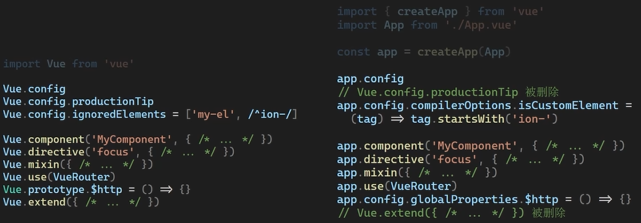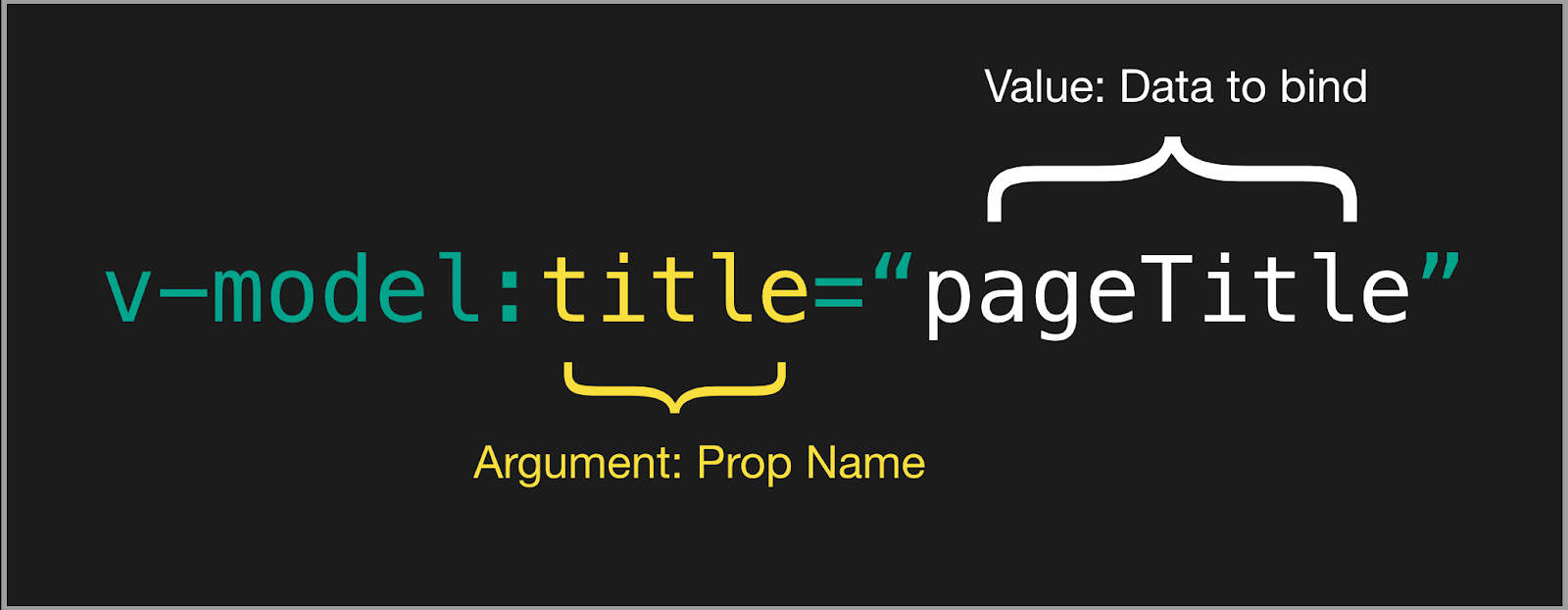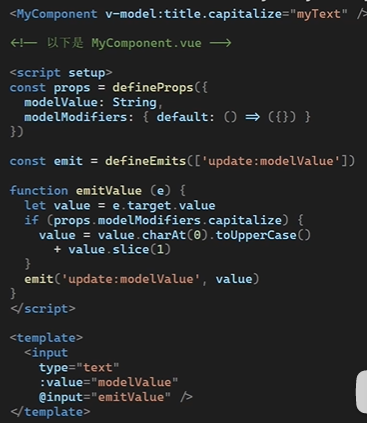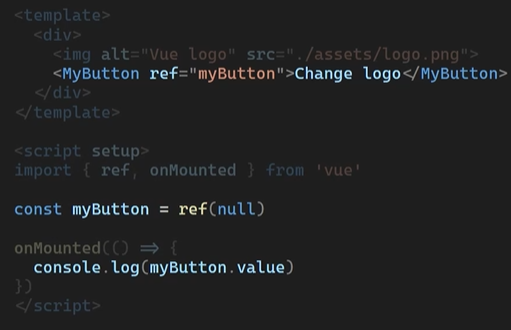Vue2 迁移到 Vue3
Vue 3 Migration Guide | Vue 3 Migration Guide (vuejs.org)
Vue3 的新功能
- 复合接口 -Composition API
- SFC Composition API Syntax Sugar (
<Script setup>) - 传送
- 碎片
- 发出组件选项
- 从
@vue/运行时核心``创建呈现器API,以创建自定义呈现器 - SFC 状态驱动的 CSS 变量(
<样式>中的v 绑定) - SFC
<样式范围>现在可以包括全局规则或仅针对已开槽内容的规则 - 悬疑 实验
全局 API 变更
创建实例
Vue2
import Vue from 'vue'
import App from './App.vue'
const vm = new Vue({
render: h => h(app)
})
vm.$mount('#app')Vue3
import { createApp } from 'vue'
import App from './App.vue'
const app = createApp(App)
app.mount('#app')全局 API 变更为实例 API

| Vue2 | Vue3 |
|---|---|
| Vue.config | app.config |
| Vue.config.productionTip | 🗑️已删除 |
| Vue.config.ignoredElements = ['my-el', /^ion-/] | app.config.compilerOptions.isCustomElement = (tag) => tag.startsWith('ion-') |
| Vue.componment('MyComponent',{ /* ... */}) | app.componment('MyComponent',{ /* ... */}) |
| Vue.directive('focus',{ /* ... */}) | app.directive('focus',{ /* ... */}) |
| Vue.mixin() | app.mixin() |
| Vue.use() | app.use() |
| Vue.prototype | app.config.globalProperties |
| Vue.extend | 🗑️已删除 |
在 Apps 之间共享组件/配置
在应用程序之间共享配置(例如组件或指令)的一种方法是创建工厂函数,如下所示:
import { createApp } from 'vue'
import Foo from './Foo.vue'
import Bar from './Bar.vue'
const createMyApp = (options) => {
const app = createApp(options)
app.directive('focus' /* ... */)
return app
}
createMyApp(Foo).mount('#foo')
createMyApp(Bar).mount('#bar')Provide / Inject
// in the entry
app.provide('guide', 'Vue 3 Guide')
// in a child component
export default {
inject: {
book: {
from: 'guide'
}
},
template: `<div>{{ book }}</div>`
}默认导出变为命名导出
Vue2
import Vue from 'vue' //Vue是构造函数
const { nextTick, observable } = VueVue3
import { nextTick, observable } from 'vue'
// 或者
import * as Vue from 'vue
// Vue是命名空间模板指令变更
v-model - vue2
v-model
在 2.x 中,在组件上使用 v-model 等效于传递
value属性并发出input事件,
<ChildComponent v-model="pageTitle"/>
<!-- 等价于 -->
<ChildComponent
:value="pageTitle"
@input="pageTitle = $event" />如果我们想将 prop 或事件名称更改为其他名称,则需要向组件添加一个 model 选项
export default {
model: {
prop: 'title',
event: 'change'
},
props: {
// this allows using the `value` prop for a different purpose
value: String,
// use `title` as the prop which take the place of `value`
title: {
type: String,
default: 'Default title'
}
}
}v-bind.sync
在某些情况下,我们可能需要对属性进行 " 双向绑定 "。
例如,对于使用 prop 的上一个示例,我们可以传达分配新值的意图:v-model update:myPropName ChildComponent title
this.$emit('update:title', newValue)然后,父级可以侦听该事件并根据需要更新本地数据属性。例如:
<ChildComponent :title="pageTitle" @update:title="pageTitle = $event" />为方便起见,我们用修饰符为这个模式做了一个简写:.sync
<ChildComponent :title.sync="pageTitle" />v-model - vue3
v-model
在 3.x 中,自定义组件相当于传递属性并发出事件:v-model modelValue update:modelValue
v-bind.sync 和 v-model 合并了
<ChildComponent v-model="pageTitle" />
<!-- would be shorthand for: -->
<ChildComponent
:modelValue="pageTitle"
@update:modelValue="pageTitle = $event"
/>要更改 model 名称,而不是组件选项,现在我们可以将参数传递给:model v-model
<ChildComponent v-model:title="pageTitle" />
<!-- would be shorthand for: -->
<ChildComponent :title="pageTitle" @update:title="pageTitle = $event" />
我们在自定义组件上可以使用多个 v-model
<ChildComponent v-model:title="pageTitle" v-model:content="pageContent" />
<!-- would be shorthand for: -->
<ChildComponent
:title="pageTitle"
@update:title="pageTitle = $event"
:content="pageContent"
@update:content="pageContent = $event"
/>v-model 自定义修饰符

迁移策略
检查代码库的使用情况,并将 .sync 替换为:v-model
<ChildComponent :title.sync="pageTitle" />
<!-- to be replaced with -->
<ChildComponent v-model:title="pageTitle" />对于所有没有参数的 .sync,请确保将 prop 和事件名称分别更改为 modelValue update:modelValue
<ChildComponent v-model="pageTitle" />// ChildComponent.vue
export default {
props: {
modelValue: String // previously was `value: String`
},
emits: ['update:modelValue'],
methods: {
changePageTitle(title) {
this.$emit('update:modelValue', title) // previously was `this.$emit('input', title)`
}
}
}v-if 优先级高于 v-for
v-bind 绑定顺序变更
在 2.x 中,如果元素同时定义了两个属性并定义了相同的单个属性,则该单个属性将始终覆盖 v-bind 中的绑定
<!-- template -->
<div id="red" v-bind="{ id: 'blue' }"></div>
<!-- result -->
<div id="red"></div>在 3.x 中,如果元素同时定义了两个属性,并且定义了相同的单个属性,则声明绑定的顺序决定了它们如何合并。换句话说,开发人员不再假设单个属性始终覆盖 v-bind 中定义的内容,开发人员现在可以更好地控制所需的合并行为
🗑️v-on.native
你可能想在某个组件的根元素上监听一个原生事件。可以使用 v-on 的修饰符 .native
通俗点讲:就是在父组件中给子组件绑定一个原生的事件,就将子组件变成了普通的 HTML 标签,不加 '. native' 事件是无法触 发的。
可以理解为该修饰符的作用就是把一个 vue 组件转化为一个普通的 HTML 标签,并且该修饰符对普通 HTML 标签是没有任何作用的
vue2
<my-component
v-on:close="handleComponentEvent"
v-on:click.native="handleNativeClickEvent"
/>vue3
未声明在 emits 中的原生事件会绑定到根元素上
<my-component
v-on:close="handleComponentEvent"
v-on:click="handleNativeClickEvent"
/>
<script setup>
defineEmits(['close'])
</script>组件
异步组件
渲染函数
vue2
// Vue 2 Render Function Example
export default {
render(h) {
return h('div')
}
}h 由库提供而不是函数参数
vue3
在 3.x 中,现在是全局导入的,而不是作为参数自动传递的
// Vue 3 Render Function Example
import { h } from 'vue'
export default {
render() {
return h('div')
}
}VNode Props Format
// 2.x
{
staticClass: 'button',
class: {'is-outlined': isOutlined },
staticStyle: { color: '#34495E' },
style: { backgroundColor: buttonColor },
attrs: { id: 'submit' },
domProps: { innerHTML: '' },
on: { click: submitForm },
key: 'submit-button'
}在 3.x 中,整个 VNode 道具结构是扁平的
// 3.x Syntax
{
class: ['button', { 'is-outlined': isOutlined }],
style: [{ color: '#34495E' }, { backgroundColor: buttonColor }],
id: 'submit',
innerHTML: '',
onClick: submitForm,
key: 'submit-button'
}已删除的 Api
不再支持使用数字作为 v-on 的修饰符
在 Vue 2 中
<!-- keyCode version -->
<input v-on:keyup.13="submit" />
<!-- alias version -->
<input v-on:keyup.enter="submit" />此外,您还可以通过全局选项定义自己的别名。config.keyCodes
Vue.config.keyCodes = {
f1: 112
}
<!-- keyCode version -->
<input v-on:keyup.112="showHelpText" />
<!-- custom alias version -->
<input v-on:keyup.f1="showHelpText" />Vue 3 中
现在建议对要用作修饰符的任何键使用 kebab-case 名称。
<!-- Vue 3 Key Modifier on v-on -->
<input v-on:keyup.page-down="nextPage">
<!-- Matches both q and Q -->
<input v-on:keypress.q="quit">🗑️$chilren 被删除
在 2.x 中,开发人员可以使用以下命令访问当前实例的直接子组件:this.$children 在 3.x 中,该属性将被删除,不再受支持。相反,如果需要访问子组件实例,我们建议使用 模板引用。
即 ref
